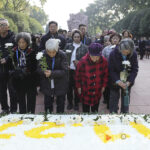Municipal Party Committee Standing Committee Holds Meeting to Firmly Support the Central Committee’s Decision on Disciplinary Review and Supervision Investigation of Jiang Duntao
Municipal Party Committee Standing Committee Holds Meeting
Firmly Support the Central Committee’s Decision on
Disciplinary Review and Supervision Investigation
On the morning of October 26, the Municipal Party Committee Standing Committee held a meeting to announce the situation regarding Jiang Duntao’s suspected serious disciplinary and legal violations, and his acceptance of disciplinary review and supervision investigation by the Central Commission for Discipline Inspection and National Supervisory Commission. All attending comrades unanimously expressed their firm support for the Central Committee’s decision and their firm support for the Central Commission for Discipline Inspection and National Supervisory Commission’s decision.
The meeting emphasized the need to deeply learn from this lesson and maintain constant vigilance. Strengthen absolute loyalty, persistently use Xi Jinping Thought on Socialism with Chinese Characteristics for a New Era to consolidate ideology, always prioritize political discipline and political rules, maintain clear-mindedness at all times, ensure orders are followed and prohibitions are observed, and always maintain consistency with the Central Committee with Comrade Xi Jinping at its core in thought, politics, and action.
The meeting pointed out the need to deeply understand that the situation in our city’s anti-corruption struggle remains severe and complex, resolutely implement the Party’s self-revolution requirements, always maintain political determination to keep fighting corruption, insist on increasingly strict measures without wavering, and deeply advance comprehensive and strict governance of the Party. Comprehensively strengthen supervision of “top leaders” and key position leading cadres, closely monitor important matters such as major policy formulation, major project approvals, and cadre selection and appointment, continuously increase supervision and inspection efforts, improve power operation standardization and constraint mechanisms, and enhance major matter reporting and supervision mechanisms.
The meeting emphasized that municipal-level leading cadres must take the lead in bearing the responsibility of governing the Party, strictly maintain integrity and self-discipline, carry forward the self-revolutionary spirit of turning the blade inward, maintain the determination that “the blacksmith must be strong enough to handle the iron,” consciously purify their “circle of friends,” “social circles,” and “life circles,” actively build clean government-business relationships, effectively strengthen family education and family tradition construction to build a family integrity defense line, consciously and actively accept intra-Party supervision, public supervision, and media supervision, always be politically clear-headed and honest people, set examples for Party members and cadres with integrity, and continuously inject momentum into creating a clean political ecology and development environment.
Municipal Party Committee Standing Committee
The “Municipal Party Committee Standing Committee” is the core leadership body of a Chinese Communist Party (CCP) committee in a city. It is a small group of high-ranking officials who make day-to-day decisions and implement the policies of the larger Party committee. Historically, such standing committees have been a fundamental part of the CCP’s structure since the party’s rise to power, ensuring centralized leadership and control at all levels of government across China.
Central Committee
The term “Central Committee” most famously refers to the central administrative body of a communist party, such as the Central Committee of the Communist Party of the Soviet Union. Historically, it was a large, elected body that held supreme authority between party congresses and was responsible for directing party policy and work. Its power, however, was often concentrated within its smaller executive bodies, like the Politburo.
Central Commission for Discipline Inspection
The Central Commission for Discipline Inspection (CCDI) is the highest internal control institution of the Chinese Communist Party, responsible for enforcing party discipline and combating corruption. Established in 1978, it operates as a key mechanism for maintaining internal party oversight and governance. The CCDI plays a central role in the Party’s ongoing anti-corruption campaigns and disciplinary enforcement efforts.
National Supervisory Commission
The National Supervisory Commission is China’s highest anti-corruption agency, established in 2018 as part of a major institutional reform. It merged various anti-graft functions previously scattered across different party and government bodies to create a unified supervision system. The commission exercises authority over all public officials who exercise public power, representing a significant expansion of the Communist Party’s disciplinary oversight mechanisms.
Xi Jinping Thought on Socialism with Chinese Characteristics for a New Era
“Xi Jinping Thought on Socialism with Chinese Characteristics for a New Era” is a political theory that was established as a guiding ideology for the Communist Party of China at its 19th National Congress in 2017. It outlines the principal policies and strategic directions for China’s development in the new era, building upon previous socialist theories with Chinese characteristics. The thought addresses contemporary challenges and sets forth the path for achieving national rejuvenation and modernization.
Party’s self-revolution requirements
“Party’s self-revolution requirements” refers to the Chinese Communist Party’s ongoing internal campaign to maintain discipline, combat corruption, and reinforce ideological unity within its ranks. This political concept, heavily promoted under Xi Jinping’s leadership, represents the Party’s effort to continuously reform and purify itself to ensure its long-term governance. It is a modern ideological framework rather than a physical place or traditional cultural site.
comprehensive and strict governance of the Party
The phrase “comprehensive and strict governance of the Party” refers to a major political campaign launched by the Communist Party of China (CPC) in 2012. This ongoing initiative aims to strengthen internal Party discipline, combat corruption, and reinforce the CPC’s leadership authority. It represents a significant effort in the Party’s modern history to maintain its governance capacity and ideological unity.
clean political ecology
“Clean political ecology” is not a specific place or cultural site but a conceptual framework. It refers to an interdisciplinary field of study that examines the relationship between political systems, power dynamics, and environmental issues, focusing on sustainability and justice. This concept emerged from academic discourse in the late 20th century, critiquing how political and economic structures influence environmental management and policy.



